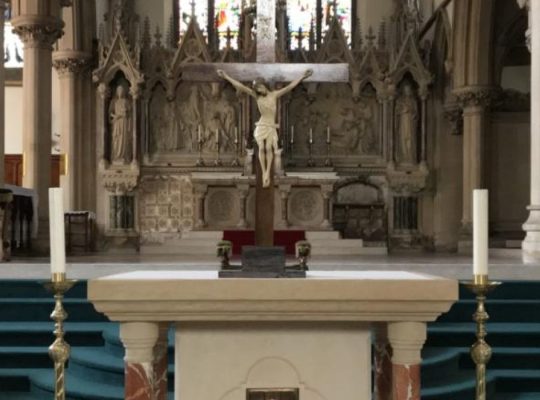The Book of Ecclesiasticus which we read today is like a traditional catechism, a compendium of received truths that never attempts to expand one’s reflection by opening up new perspectives.
In the framework of the liturgical celebration, one must read these maxims in themselves, devoid of context. They present some of the thought current at the time of the Old Testament and help us to realise what is old and what is new in other readings, being deeply rooted in ancient ground. Today’s reading is reminiscent of last week’s readings; God the just judge who listens to the prayers the humble. God “is a God of Justice,”the just judge. To judge with perfect impartiality, without differentiating between individuals, truly belongs to the divine. All those who have the responsibility of exercising justice must force themselves to resemble, as nearly as possible, this just Judge. However, no one can match his perfection. We must reckon not only with human weakness and the pressures the rich and powerful can bring to bear on the best intentioned judges, but also — alas! — the bad faith of those who “neither [fear] God nor [respect] any human being.” For many of the poor, weak, and helpless, God the just Judge, is the only hope, for he does hear them. Even better, he has a particularly attentive ear for “the cry of the oppressed,” “the wail of the orphan,” “the widow when she pours out her story” God is the appointed defender of the powerless, at whose side he always stands. But here, the “lowly” is not only a representative of the outcast social category but one “who serves God willingly,” “the righteous” whose poverty matches an interior disposition, an attitude of soul. Such a “poor” person can be confident of the efficacy of persevering prayer. But that very quality is also the precondition of it. Thus, we have a text that speaks with utmost simplicity of the deep and unshakable conviction of the believer of all ages.
One now turns to today’s Gospel. The parable of the Pharisee and the tax collector is found only in Luke. It is well known, but for that very reason must be read carefully, avoiding the pitfall of a reading that is too shallow or cliched. First, we see the figure of the Pharisee. For various reasons, the term has acquired an entirely negative connotation. Thus, when the Gospel speaks of them, we immediately think of them as “hypocrites or proud men” who wish to be thought worthy by their minute observance of the rules of the Mosaic law. The synonyms of “phariseeism” are thus “duplicity, hypocrisy, double dealing.”
There certainly were “bad” Pharisees; Jesus often upbraids them, in a quite lively manner, for their behaviour. But not everyone — or even most — of them would deserve the ill repute into which the whole sect has fallen. Besides, the Pharisees themselves castigated those who, in making use of their movement discredited it. This can be seen in the Talmud, written at the beginning of the Christian Era. With humour, and not without some very pointed remarks, they distinguish seven categories in the sect, six of which have titles that justify the accusations against them: They are: “The ‘strong shouldered’, who carry there deeds on their backs to receive honour from men. — The ‘stumblers,’ who, in order to be noticed, drag themselves through the streets and stub their toes on rocks. — The ‘head-knockers’, who avert their eyes so that they may not see women, and knock their heads against the walls. — The ‘humiliated,’ who walk doubled over. — The ‘Pharisees of calculation,’ who only practice the Law so that they may reap the rewards it promises. — The ‘Pharisees of fear,’ who only do good out of fear of punishment. — The ‘Pharisees of devotion,’ who are the best of the lot.” In the imaginative language of the Jewish mind these are the seven sorts of Pharisees.
Among the evangelists, Luke is the one who best distinguishes between Pharisees. He tells us, for example, that one day some Pharisees came to find Jesus to tell him: “Go away, leave this area because Herod wants to kill you.” In Acts, little mention is made of the Pharisees. But one of them, called Gamaliel, “a teacher of the law, respected by all the people,” played the role of a moderator when the apostles appeared before the Sanhedrin. Again, later on, some Pharisees were forced to acquit Paul. There is really only one mention of a Pharisee persecuting the first Christian community: Saul himself, before becoming the apostle Paul! The Sadducees were the persecutors, and with the “priestly party” bear the chief responsibility for Jesus’ death.
In short, though there may have been some deviations, the Pharisee were eminently respectable and religious people, rigorous observers of the Law, models of piety admired and loved by the people. What the Pharisee in the parable says is undoubtedly true: he avoids all sin, he fasts twice a week, he gives a tenth part of all he earns. The parable thus, does not present him as a hypocrite or a pious show off. It is quite understandable that he would thank God for not being like “the rest of humanity…..or even this tax collector” who “stood off at a distance.” Since the parable rests on a comparison, this point must be emphasised. But it should not be accentuated to the point of decrying the Pharisee for having a contempt for others. Who has not thanked God for not being a worthless person, a rake, a “reputable” thief, etc., as are so many people around us, at least according to the newspapers? This much must be admitted: such a “thanksgiving” is not necessarily perverse.
But, as we already know, this man at prayer is, in the parable, the type of “those who were convinced of their own righteousness,” to whom Jesus addresses the story. The Pharisee seems to be entirely turned towards God. But isn’t he really turned towards himself? Does he truly give thanks to God or does he simply delight in himself? It is a question of tone, to be sure.
The comparison between the Pharisee’s and the tax collector’s prayer illuminates the point of the parable. As the one represents “those who believed in their own self-righteousness,” the other is the very type of the sinner: by his situation and trade dedicated to injustice and impiety. He sold himself to the Roman occupiers, collecting their taxes and profiting himself thereby. Tax collectors were not honest functionaries with set salaries. They had to pay their employers a fixed sum. For their own profit, they merely had to demand more than the actual rate. No control or check was put on them. The level of their cheating would vary to their particular consciences. And as they were rather rich, like Zacchaeus…. Indeed, this was a form of profitable prostitution. “Sinners” is quite an appropriate tag. The tax collector in the parable recognises this. He dares not lift his eyes to heaven. Knowing his state, he turns toward God: “Be merciful to me, a sinner.” That is all.
On the one hand we see a man who is thought to be, if not “just,” at least in good standing with God. On the other hand, a sinner who, by confessing himself as such, simply awaits the mercy of a pitying God. The first can even enumerate his virtues. The second experiences the complete poverty of a sinner. A Pharisee who asks nothing from God, not even blessings; they come of their own accord. A tax collector who longs for everything. So, this man “went home [from the Temple] justified” but the other did not. His prayer, a confident appeal to the mercy of God, has pierced the clouds.
God does not see in the tax collector virtues that he does not possess. He does not argue with the Pharisees claims. But he is God. And “to become just” is out of human reach, it is the grace of God. It would have been sufficient for the Pharisee to see himself as “a useless servant” as the tax collector saw himself as a bad or misguided servant. Both would then “become just.” And the Father would have invited both his sons to “celebrate and rejoice.”
But why all these verbs in the past tense? It is to us that the parable is addressed, who are threatened by the perpetual danger of a self-satisfied phariseeism, which is all the more threatening — in an insidious way — as we demonstrate our fidelity to a rigorous practice. The temptation perhaps, is not that of pride at not being like other people, or even like so many sinners around us; there is so much that is absurd in such self-satisfaction that one can manage to guard against it, at least in front of others, most often. The temptation consists rather in forgetting that even a true saint is, and remains, a sinner who must say constantly and from the depths of his heart: “O God, be merciful to me.” What is finally at stake here is nothing less than the truth of God recognised by the truth of our attitude before him, which is particularly expressed in our prayer.
“For everyone who exalts himself, will be humbled, and the one who humbles himself will be exalted.”This is not the proclamation of a reversal of status that will occur at the end of time. It is the affirmation of what happens today, because God is God. God raises the lowly and sinners to himself by giving his grace to them, but he leaves to their absurd pretended greatness those who believe they can raise themselves. This is what the beatitudes and the Magnificat say.
The three readings today face us with the judgement of God, and they demonstrate the only attitude that is appropriate to us. The Lord is a judge who, far from despising the poor, heeds their prayers and gives them justice. It is from him alone that justification comes, and not from the wealth of merits on which we pride ourselves. The tax collector of the Gospel raises toward God a prayer of the poor; he returns home justified. The Pharisee, on the other hand, can receive no grace, since he seems to be ignorant of his need for it. Heeding this lesson, the Church, at the beginning of each Eucharistic celebration, has us turn toward God to beg his mercy. But all of Christian prayer must have the humility that is found in the tax collector.
“Kyrie, eleison. Christe, eleison. Kyrie, eleison.”


